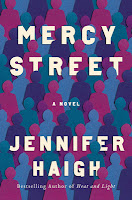Mercy Street is a women's clinic, offering a wide variety of services, in Boston, and the novel follows several different characters whose lives intersect at some point, many of them related to the clinic. Claudia is a woman in her 40's who works as a counselor at the clinic. She grew up poor, in rural Maine, the only child of a mother living in a trailer who took in dozens of foster kids during Claudia's childhood. While her mother worked two jobs, Claudia ended up being the primary caregiver for most of the children, even though she was very young herself. Her background allows her to understand many of her young, poor clients' lives. Anthony grew up in the Boston area and was injured while working construction as a young adult. His head injury has had lingering effects, so he is on disability and living in his mother's basement. He spends all of his time attending daily mass at the neighborhood Catholic church and being involved with their anti-abortion efforts, which includes protesting at Mercy Street. Timmy grew up with Anthony and has known him since childhood. Now he supports himself, and his son in Florida, by dealing weed. Both Claudia and Anthony are customers of Timmy's, and they meet one day at his apartment. Victor lives in rural Pennsylvania and is a racist and an extremist, stockpiling guns and food. His reasons for being anti-abortion are very different than Anthony's: he believes that women of color are reproducing faster than white women, and therefore, any white woman who aborts her baby should be shamed and brought to justice. He meets Anthony online and asks him to set up a website with a "Hall of Shame," featuring photos of women going into clinics, including Mercy Street (even though many women are there for other reasons). Anthony is committed to the cause for moral reasons, but Victor is clearly dangerous.
The novel follows each of these characters individually, in separate chapters, as their lives unknowingly intersect and affect each other. I have given a lot of thought to why I love Haigh's novels so much and what makes them so compelling. As in Mercy Street, she mostly writes about ordinary people living ordinary lives, but she's such a talented writer that she brings those characters to life on the page. By the end of this novel, you really care about Claudia, Anthony, and Timmy (maybe not Victor!) and want to know what happens to them. Each of these characters is something of a loner, so this novel doesn't have the same focus on a single family as many of her previous novels, but you get their family backgrounds and (limited) current relationships through flashbacks and the present narrative. In writing from so many different perspectives, Haigh gives the reader insight into each of their lives, motivations, and values. The audio book was read by a single narrator, but she did a great job, and I was thoroughly immersed in the story. Of course, as in Faith, there is a controversial issue at the heart of this novel, but it's about the people, not the issue. And I think that's what makes Haigh's novels so compulsively readable and engaging: the people, who feel entirely real on the page.
352 pages, Ecco
HarperAudio
You can watch/listen to an interview with Jennifer Haigh about Mercy Street, interviewed by author Jess Walter and hosted by Parnassus Books (which is owned by author Ann Patchett). She talks about how she got the idea for the novel, the cover, and the class issues in the novel.
This book fits in the following Reading Challenges:
M in the Alphabet Soup Challenge
Massachusetts in the Literary Escapes Challenge
Visit my YouTube Channel for more bookish fun!
Listen to a sample of the audiobook here, from the start of the novel and one of Claudia's chapters, and/or download it from Audible.
You can buy the book through Bookshop.org, where your purchase will support the indie bookstore of your choice (or all indie bookstores)--the convenience of shopping online while still buying local!
Or you can order Mercy Street from Book Depository, with free shipping worldwide.


I have never read a novel by this author, but all the ones you described sound really good. I'm adding her to my TBR list!
ReplyDeleteI think Baker Towers is still my favorite, Helen - enjoy!
Delete